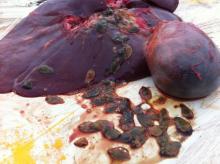£300 million annually - This is the estimated cost of liver fluke to the UK agricultural industry.
Liver fluke can result in:
- Reduced weight gain
- Reduced milk production
- Decreased feed conversion ratio
- Reduced fertility
- Young stock fail to thrive
- Death of animals
- Poor welfare
Cattle are more commonly affected by the chronic form of this disease. Whereas acute disease results from mass migration of immature fluke through the liver (the typical picture in sheep) Chronic disease occurs when smaller numbers of fluke larvae are consumed over a longer period. Damage to the liver by the immature fluke is therefore less severe and the animal survives long enough for the fluke larvae to mature.
Clinical signs in cattle include:
- Weight loss and poor weight gain
- Anaemia
- Oedema – swelling typically seen under the jaw or brisket
- Diarrhoea
- Reduced fertility
- Decreased milk production
- Increased susceptibility to other diseases
If you see some of these signs, please discuss with your vet immediately.
Life Cycle
The fluke eggs need temperatures above 10C to develop, but can survive on pasture over winter to develop the following spring. The mud snail, an essential part of the life cycle, also need temperatures above 10C to end hibernation and are only found in water-logged areas.
Diagnosis
- Visualising fluke within the liver
- Faecal worm egg counts (WEC) indicate chronic disease. However, adult fluke shed eggs sporadically and mature fluke will not produce eggs, so it is possible to miss.
- We can test for fluke antibodies by carrying out a blood test. These antibodies can persist for up to 9 months, so a positive result shows that there has been exposure to fluke within that time.
- Fluke antibodies can also be tested for on bulk milk and if tested regularly could alert you to a new challenge.
Control
- Avoid grazing wetter pastures during high risk periods of the year. See the NADIS website for fluke forecasts. (http://www.nadis.org.uk/parasite-forecast.aspx)
- Quarantine bought in animals and treat with a flukicide which can kill immature fluke and where feasible keep them on drier pastures for 3 - 4 weeks.
There are many different flukicides on the market with varying efficacy against early or late, immature or mature fluke. Different products may be appropriate at different times of year.
We are happy to discuss a fluke control strategy specific to the risks on your farm, please contact the practice and speak to one of our farm vets - 01363 772860.
More information can also be found on the COWS website or read the fact sheet here - Liver Fluke in Cattle.


